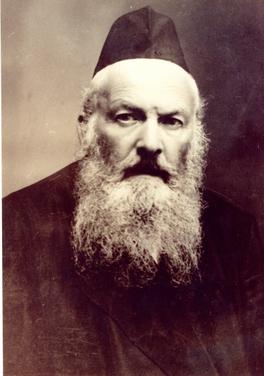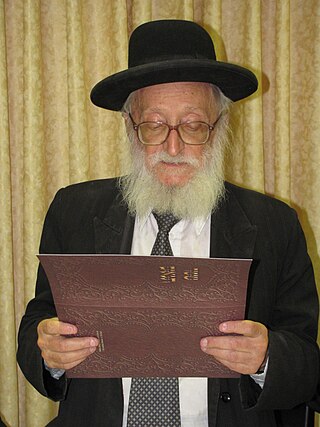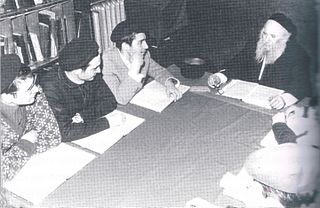Related Research Articles

Kiryat Mattersdorf is a Haredi neighborhood in Jerusalem. It is located on the northern edge of the mountain plateau on which central Jerusalem lies. It is named after Mattersburg, a town in Austria with a long Jewish history. It borders Kiryat Itri and Romema. The main thoroughfare is Panim Meirot Street, which segues into Sorotzkin Street at the neighborhood's eastern end. In 2015, Kiryat Mattersdorf had approximately 700 residents.

Mordechai Gifter was an American Haredi rabbi. He was the rosh yeshiva (dean) of the Telz Yeshiva in Cleveland.

Elchonon Bunim Wasserman was a prominent rabbi and rosh yeshiva (dean) in prewar Europe. He was one of the closest students of Yisrael Meir Kagan and a noted Talmid Chacham. In the interwar period, he served as rosh yeshiva of Yeshiva Ohel Torah-Baranovich. He was murdered during the Holocaust.

Rephoel Baruch Sorotzkin was the Rosh Yeshiva of the Telz Yeshiva in Cleveland and among American Jewry's foremost religious leaders.
Israel or Yisrael Mendel Kaplan, known as "Reb Mendel" was an American Orthodox Jewish rabbi and author. He was best known as a teacher in the Hebrew Theological College of Chicago and the Talmudical Yeshiva of Philadelphia, where he mentored many future leaders of Orthodox Jewry.

Aryeh Leib Malin (1906–1962) was a Polish-born American Haredi Jewish rabbi, Talmudic scholar, and Mussarist who taught the Torah and spread rabbinical education in Europe, China, Japan, and the United States.
Shlomo Heiman, (1892–1944) known informally as "Reb Shlomo", was a rabbi, Talmudist, and rosh yeshiva. He led some of the most prominent yeshivas in Europe and the United States.

Chona Menachem Mendel (Mendel) Weinbach was an Orthodox Jewish rabbi, educator, author, and speaker. As the co-founder and dean of Ohr Somayach Institutions, a Jerusalem-based yeshiva for newly-observant Jewish men, he was considered one of the fathers of the modern-day baal teshuva movement.
Naftoli (Naphtalie) Carlebach (1916–2005) was an Orthodox Jewish rabbi and accountant.

Ezrat Torah is a Haredi neighborhood in northern Jerusalem. It is bordered by Kiryat Sanz on the west, Golda Meir Blvd. on the north and east, and Shikun Chabad and Tel Arza on the south.
Rabbi Nochum Partzovitz was a rabbi and Rosh Yeshiva of Yeshivas Mir and is known worldwide for erudite explanations of Talmudic topics.

Yeshiva Ohr Elchonon is a Lithuanian-style Orthodox yeshiva in Jerusalem. The yeshiva was initially established in 1953 in Los Angeles, California, by Rabbi Simcha Wasserman, who named it in memory of his father, Rabbi Elchonon Wasserman, rosh yeshiva in Baranowicz, who was murdered in the Holocaust in Lithuania. The yeshiva operated in Los Angeles from 1953 to 1977, when it was sold to the Chabad movement. After Wasserman immigrated to Jerusalem, he established another Yeshiva Ohr Elchonon in the Ezrat Torah neighborhood in 1979. A second branch was opened in the Romema neighborhood in 1993. Ohr Elchonon enrolls hundreds of boys in yeshiva ketana and yeshiva gedolah, and close to 100 married men in its kollel. Additional yeshiva ketana branches have been established in the Israeli cities of Modiin Illit, Rishon Letzion, and Tiberias.

The Yeshiva of Aix-les-Bains is one of the principal Talmudic academies in France. It is officially named Yeshivas Chachmei Tsorfat after the medieval rabbinic authorities who lived in France, including Rashi and many Baalei Tosafot. Since 1945, the Yeshiva has been located in the spa town of Aix-les-Bains, and is directed currently by Rabbi Yitzhak Weil.

Yonah Karpilov, known among his peers as Rav Yonah Minsker, was an Orthodox yeshiva student in what is now Belarus. He was considered a genius and was said to be the "greatest of all yeshiva bachurim in pre-war Europe."
Yeshiva Ohel Torah-Baranovich, commonly referred to as the Baranovich Yeshiva or simply as Baranovich, was an Orthodox Jewish yeshiva in Baranavichy, Belarus. Established circa 1906 by Rabbi Yosef Yoizel Horowitz, the Alter of Novardok (Navahrudak), it attracted leading rabbis such as Rabbi Yisroel Yaakov Lubchansky and Rabbi Avraham Yoffen as instructors, but was forced to disband with the outbreak of World War I. After the war, Rabbi Elchonon Wasserman, a student of the Radin Yeshiva who had been forced into exile in Smilavičy during the hostilities, agreed to serve as rosh yeshiva (dean) upon the recommendation of the Chofetz Chaim. In the interwar period, the yeshiva gained widespread fame and a large student body. Wasserman's style of teaching emphasized the simple meaning of the Talmudic texts and students advanced to the point that they were able to study independently. The yeshiva went into exile and disbanded a second time during World War II, and Wasserman and many of the students were murdered by Lithuanian Nazi sympathizers. Torah institutions named after the Baranovich Yeshiva and Wasserman were later established in the United States and Israel.

Nisson Wolpin was an Orthodox rabbi and (1932-2017), renowned for being the editor of The Jewish Observer. He also served as the learning director of Camp Munk for many summers.

Rabbi Aryeh Leib Baron was a Russian-born Canadian Haredi Jewish rabbi and rosh yeshiva (dean) of Yeshiva Merkaz HaTorah and the rabbi of Beis Medrash Merkaz HaTalmud in Montréal, Canada, as well as the founder of Yeshiva Ahavas Torah Baranovich in Jerusalem.

Rabbi David HaKohen Rappoport was an Orthodox Jewish rabbi in Baranovich, Belarus. He is known for leading Yeshiva Ohel Torah in Baranovich alongside Rabbi Elchonon Wasserman.
Rabbi Aharon Sorasky is a Haredi author in Israel, his specialty being biographies about Orthodox rabbis. He has also written under the pseudonym A. Safran.
References
- ↑ Names and authorities database of the National Library of Israel.
- 1 2 3 4 5 6 Mathis Chazanov (November 5, 1992). "Rabbi Wasserman, a Pioneer Educator, Dies". The Los Angeles Times .
- ↑ "2 Cheshvan". Torah Umesorah.
- ↑ Sorasky 2009, pp. 185–7.
- 1 2 "Rav Mendel Weinbach" (PDF). p. 13.
- ↑ Akiva Tatz; Yaakov Branfman (1994). Reb Simcha Speaks: Rabbi Simcha Wasserman's Insights. ISBN 978-0899-06116-0.
- ↑ Yochanan Gordon (October 27, 2013). "Something Positive For A Change". Five Towns Jewish Times .
- ↑ Rabbi Simcha Wasserman (November 1970). "Memorandum To: Concerned individuals From: Rabbi Simcha Wasserman Re: Reaching out" (PDF). The Jewish Observer . pp. 3–5.
- ↑ Zadok Shmuel Suchard (2005). Inspiring Insights Into the Parashah. p. 158. ISBN 1583308172.
As Rabbi Simcha Wasserman ... a potato created in a laboratory may ...
- ↑ "Letter from Rabbi Elazar Simcha Wasserman".